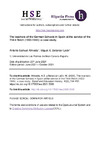Please use this identifier to cite or link to this item:
https://accedacris.ulpgc.es/jspui/handle/10553/114446
| DC Field | Value | Language |
|---|---|---|
| dc.contributor.author | Almeida Aguiar, Antonio Samuel | en_US |
| dc.contributor.author | Betancor León, Miguel Ángel | en_US |
| dc.date.accessioned | 2022-04-27T10:18:49Z | - |
| dc.date.available | 2022-04-27T10:18:49Z | - |
| dc.date.issued | 2021 | en_US |
| dc.identifier.issn | 2014-3567 | en_US |
| dc.identifier.uri | https://accedacris.ulpgc.es/handle/10553/114446 | - |
| dc.description.abstract | El presente artículo tiene como objeto identificar la participación del profesorado alemán en la implantación y extensión del nacionalsocialismo en los colegios alemanes (Deutsche Schulen) en España durante el Tercer Reich. A través de la metodología del estudio de casos, utilizando el contexto del archipiélago Canario, hemos identificado a los protagonistas, los procesos llevados a cabo, así como qué medios y estrategias fueron utilizados para alcanzar los objetivos propuestos. El fuerte arraigo de la colonia alemana asentada en las islas y su contexto, así como los intereses geoestratégicos del territorio, son elementos claves para entender la pronto adhesión de la población teutona a la causa nazi. Los resultados de la investigación muestran una evidencia clara: los Deutsche Schulen sirvieron de lugar estratégico para la extensión del nacionalsocialismo en la comunidad germana y local; el profesorado participó activamente en la extensión de la ideología de la Nueva Alemania, creando asociaciones como la Hitlerjugend o la Bund Deutscher Mäde, utilizando para ello diferentes medios de propaganda. Estas conclusiones permiten extrapolar los resultados obtenidos como marco de referencia para futuros estudios, en el resto de la geografía peninsular, en el periodo estudiado (1933-1945). | en_US |
| dc.description.abstract | The aim of this article is to identify the participation and/or adherence of German teachers and the German colony that settled in the Canary Islands in the implementation and spread of the national socialist ideology from 1933 till 1945. The quality state of this case contemplates interview to the one protagonist close to this process and documentary revision, hemerographic and archival, used as methodology tools.The results of the research have shown important findings about the processes carried out aswell as the media and strategies that were used to build a strategic place to expand the national-socialist ideology. The strong rooting of the German colony settled in the island and its context as well as the geostrategic interest of the territory are key elements to understand the quick adherence of the Teutonic population to the nazi cause. The results of the research show clear evidence: the Deutsche Schulenactively participated to favour the national-socialism ideas so that they grew and remained inthe German local community; the teachers actively participated in the expansion of the ideology of the New Germany, creating associations like the Hitlerjugendor the Bund Deutscher Mäde, using different propaganda media. These conclusions permit the extrapolation of the results obtained like a frame of reference for future studies in themainland territory during the period analysed (1933-1945). | en_US |
| dc.language | spa | en_US |
| dc.relation.ispartof | HSE Social and Education History | en_US |
| dc.source | HSE Social and Education History [ISSN 2014-3567], v. 10 (2), p. 134-157, (Junio 2021) | en_US |
| dc.subject | 550607 Historia de la educación | en_US |
| dc.subject | 5803 Preparación y empleo de profesores | en_US |
| dc.subject.other | Colegios alemanes | en_US |
| dc.subject.other | Profesores | en_US |
| dc.subject.other | Nacionalsocialismo | en_US |
| dc.subject.other | Juventudes hitlerianas | en_US |
| dc.subject.other | Canarias | en_US |
| dc.subject.other | German schools | en_US |
| dc.subject.other | Teachers | en_US |
| dc.subject.other | National socialism | en_US |
| dc.subject.other | Hitler youth | en_US |
| dc.subject.other | Canary Islands | en_US |
| dc.title | El profesorado de los colegios alemanes en España al servicio del Tercer Reich (1933-1945): un estudio de caso | en_US |
| dc.type | info:eu-repo/semantics/article | en_US |
| dc.type | Article | en_US |
| dc.identifier.doi | 10.17583/hse.2021.5308 | en_US |
| dc.description.lastpage | 157 | en_US |
| dc.identifier.issue | 2 | - |
| dc.description.firstpage | 134 | en_US |
| dc.relation.volume | 10 | en_US |
| dc.investigacion | Artes y Humanidades | en_US |
| dc.type2 | Artículo | en_US |
| dc.description.numberofpages | 25 | en_US |
| dc.utils.revision | Sí | en_US |
| dc.date.coverdate | Junio 2021 | en_US |
| dc.identifier.ulpgc | Sí | en_US |
| dc.contributor.buulpgc | BU-EGB | en_US |
| dc.description.sjr | 0,218 | |
| dc.description.sjrq | Q1 | |
| dc.description.esci | ESCI | |
| dc.description.fecytq | Q3 | |
| dc.description.fecytpuntuacion | 27,37 | |
| dc.description.dialnetimpact | 0,0 | |
| dc.description.dialnetq | Q1 | |
| dc.description.dialnetd | D2 | |
| dc.description.miaricds | 9,5 | |
| dc.description.erihplus | ERIH PLUS | |
| item.fulltext | Con texto completo | - |
| item.grantfulltext | open | - |
| crisitem.author.dept | GIR IATEXT: Patrimonio cultural: textos, materialidades y memorias | - |
| crisitem.author.dept | IU de Análisis y Aplicaciones Textuales | - |
| crisitem.author.dept | Departamento de Educación | - |
| crisitem.author.dept | GIR Educación Inclusiva, Sociedad y Familia | - |
| crisitem.author.dept | Departamento de Educación | - |
| crisitem.author.orcid | 0000-0001-9437-3147 | - |
| crisitem.author.orcid | 0000-0002-6668-878X | - |
| crisitem.author.parentorg | IU de Análisis y Aplicaciones Textuales | - |
| crisitem.author.parentorg | Departamento de Educación | - |
| crisitem.author.fullName | Almeida Aguiar, Antonio Samuel | - |
| crisitem.author.fullName | Betancor León, Miguel Ángel | - |
| Appears in Collections: | Artículos | |
Page view(s) 5
342
checked on Jan 15, 2026
Download(s)
112
checked on Jan 15, 2026
Google ScholarTM
Check
Altmetric
Share
Export metadata
Items in accedaCRIS are protected by copyright, with all rights reserved, unless otherwise indicated.
